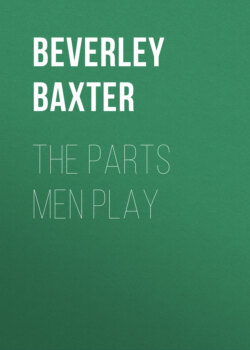Читать книгу The Parts Men Play - Beverley Baxter - Страница 4
На сайте Литреса книга снята с продажи.
CHAPTER I. LADY DURWENT DECIDES ON A DINNER. I.
ОглавлениеHis Majesty's postmen were delivering mail. Through the gray grime of a November morning that left a taste of rust in the throat, the carriers of letters were bearing their cargo to all the corners of that world which is called London.
There were letters from hospitals asking for funds; there were appeals from sick people seeking admission to hospital. There were long, legal letters and little, scented letters lying wonderingly together in the postman's bag. There were notes from tailors to gentlemen begging to remind them; and there were answers from gentlemen to their tailors, in envelopes bearing the crests of Pall Mail clubs, hinting of temporary embarrassment, but mentioning certain prospects that would shortly enable them to. …
Fat, bulging envelopes, returning manuscripts with editors' regrets, were on their way to poor devils of scribblers living in the altitude of unrecognised genius and a garret. There were cringing, fawning epistles, written with a smirk and sealed with a scowl; some there were couched in a refinement of cruelty that cut like a knife.
But, as unconcerned as tramps plying contraband between South America and Mexico, His Majesty's postmen were delivering His Majesty's mail, with never a thought of the play of human emotions lying behind the sealed lips of an envelope. If His Majesty's subjects insisted upon writing to one another, it was obvious that their letters, in some mysterious way become the property of His Majesty, had to be delivered.
Thus it happened, on a certain November morning in the year 1913, that six dinner invitations, enclosed in small, square envelopes with a noble crest on the back, and large, unwieldy writing on the front, were being carried through His Majesty's fog to six addresses in the West End of London.
Lady Durwent had decided to give a dinner.
An ordinary hostess merely writes a carelessly formal note stating that she hopes the recipient will be able to dine with her on a certain evening. The form of her invitations varies as little as the conversation at her table. But Lady Durwent was unusual. For years she had endeavoured to impress the fact on London, and by careful attention to detail had at last succeeded in gaining that reputation. She was that rara avis among the women of to-day—the hostess who knows her guests. She never asked any one to dine at her house without some definite purpose in mind—and, for that matter, her guests never dined with her except on the same terms.
Therefore it came about that Lady Durwent's dinners were among the pleasantest things in town, and, true to her character of the unusual, she always worded her invitations with a nice discrimination dictated by the exact motive that prompted the sending.
